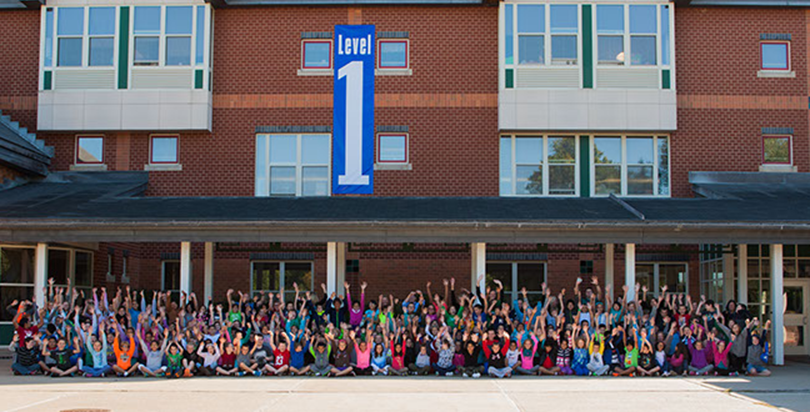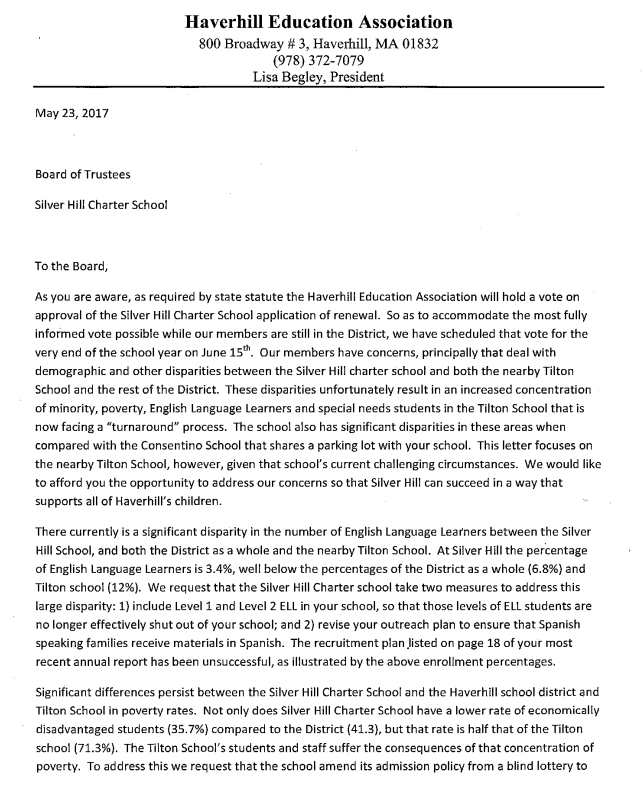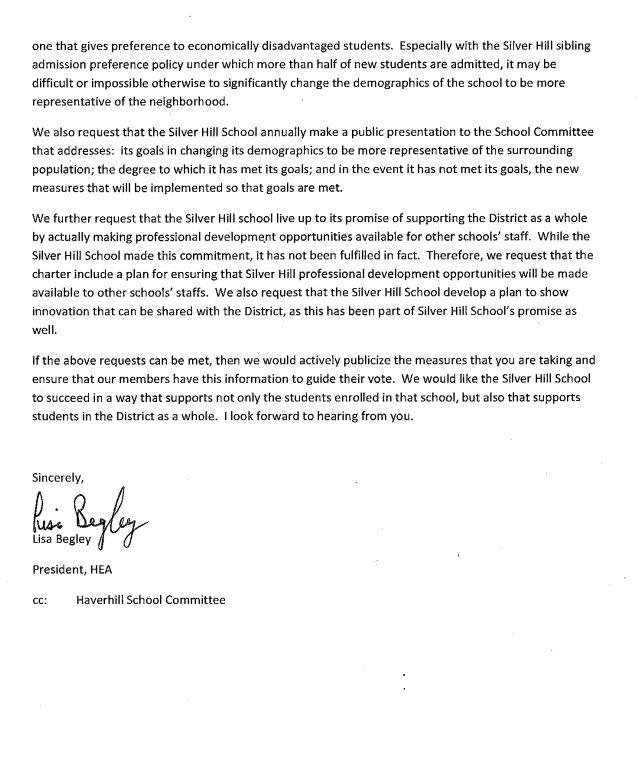A Massachusetts Teachers Union Votes to Kill a Successful Charter School, as Families Scramble for Answers

“There are no transition plans in place yet, parents are VERY concerned that they don't even know if Silver Hill would be their neighborhood school, or if in the future (if it isn't their neighborhood school) siblings would be allowed to attend,” Ferreira said. “Since no one from Haverhill Public Schools administration was there, these questions remain.”
Ferreira’s kids attend a rare kind of school allowed by Massachusetts law called a Horace Mann charter, which is overseen by the local school district. Like other charter schools of its type, Silver Hill Horace Mann Charter School is unionized, and when the school’s charter is up for renewal, the local teachers union — the Haverhill Education Association — must sign off.
A decade ago, Silver Hill was a regular Haverhill public school, performing so poorly it was slated for state takeover. The principal who was brought in to turn the school around petitioned successfully to make it an in-district charter school so the staff could decide for themselves what students needed. Within three years, it was one of the most successful schools in the district. Its teachers were proud to vote yes the first time the charter came up for renewal in 2013 — and voted overwhelmingly in favor of applying for a second renewal last fall.
But earlier this year, a new union president from another school did something unprecedented — at least in Haverhill, a city of 61,000 in the northeasternmost corner of the state. After consulting with the union’s lawyer, Lisa Begley decided to extend the vote to teachers in Haverhill’s other schools. The union then circulated materials arguing — inaccurately, in the eyes of the school’s leadership — that Silver Hill’s success came at the expense of the other schools.
In June, the union voted against renewing the charter, sending the Silver Hill community into shock. Massachusetts requires schools that are closing to let parents know what happens next within 10 days, but Ferreira and her neighbors had gone weeks without answers by the time they decided to raise their concerns at the July 27 district board meeting.
“We are parents, we are planners, we are homeowners, we are participating voters here in Haverhill, and to leave more than 400 families without answers for what their school will look like,” Ferreira, one of the leaders of a foundation that raises funds for the school’s operations, said during the televised meeting. “It’s not OK that it’s taken the whole summer for this to get going.”
Superintendent James Scully snapped at her. School would start in September as usual, he said, and nothing would change in the coming year — but he couldn’t make promises about the future.
Legally, nothing can change for a little while, Ferreira pointed out, because the school’s charter doesn’t expire until the end of the coming school year. It’s what happens after that the parents are worried about.
Scully barked again, repeating himself. Mayor James Fiorentini jumped in, proposing a meeting between the superintendent and Silver Hill parents. After some contentious back-and-forth with Fiorentini, Scully said he’d sit down with the parents if the mayor would agree to attend.
“We’re not going to change anything,” he said for a third time, “but I’m not going to make guarantees.”
Scully did not return calls seeking comment for this story, but it’s not hard to imagine why he would be on the defensive. If he does what the parents are asking and keeps the features that make Silver Hill unique and successful, he won’t satisfy the union, which wants the school to revert to a neighborhood school. If he makes the sweeping changes the union argued were the reason for rejecting the charter, he will be dismantling a successful school.
The parents and Silver Hill’s founder wish that instead, the district would put its energy into helping its other schools adopt the strategies that made Silver Hill successful. But no one else is discussing that option.
The controversy is just the latest in a recent series of brutal battles over the future of Massachusetts’s charter schools, which researchers say are the most successful in the nation. In November, after an unprecedented $42 million campaign, 62 percent of Massachusetts voters rejected a ballot measure that would have allowed the creation of 12 new charter schools a year.
Groups favoring the expansion spent $25 million. The top donor was Families for Excellent Schools, which spent $17 million. Teachers unions spearheaded the opposition via an umbrella group called Save Our Public Schools, contributing $15 million of the $17 million spent to defeat the measure.
Then, in May, delegates at the Massachusetts Teachers Association (MTA) annual convention refused to congratulate state and national Teacher of the Year Sydney Chaffee, a ninth-grade teacher at Codman Academy Charter Public School in Dorchester, who was the first Massachusetts teacher and the first charter school teacher to win the national distinction. (The state union’s parent, the National Education Association, did congratulate Chaffee.)
The MTA is also lobbying for changes that go beyond questions of charter school expansion, said Dominic Slowey, a spokesman for the Massachusetts Charter Public School Association. The union is pushing lawmakers to roll back many of the 20-year-old state policies that have made Massachusetts schools the nation’s top performers, including the collection of data that identifies high- and low-performing schools such as Silver Hill and its Haverhill neighbors. Without data that allow for the comparison of schools’ performance, new charter schools become harder to justify.
As an in-district charter, Silver Hill doesn’t belong to the association, but Slowey said the organization is tracking the fight as the latest salvo in a statewide push.
In Haverhill, parents fear changes are already being made to the school. Ferreira and others told The 74 a number of Silver Hill’s 40 teachers will not be back this fall. Several requested transfers, while others were moved involuntarily, they said. And a new assistant principal has been named.
“I'm making this appointment because Silver Hill, as we all know, has gone through a period of instability and public comments which quite frankly have been unfair to many,” Scully said in a letter to district staff. “There shouldn’t be any schools in our system that work solely for their own success rather than the success of all children in all components of our educational program."
This posture flabbergasted Euthemia Gilman, the school’s former principal and the architect of the turnaround strategy. Silver Hill’s success stems from a plan created by its teachers, she countered. Rather than close the program, she has wondered, why haven’t administrators and teachers elsewhere in the district tried some of Silver Hill’s tactics?
“This is a teacher-run school,” she said. “Staff did the planning and the research. In fact, during the 2013 renewal of the charter, the union agreed it was working and said this is proof that having professionals run the schools, and not the politicians, works.”
Gilman has a long history with Silver Hill. She taught there when the school opened in 1993 and was principal a decade ago, when it was slated for state takeover. Confident she understood the root causes of the underperformance, Gilman asked for and got permission to run the school as a Horace Mann charter.
There are only a handful of these schools, which are unique to Massachusetts. They are allowed to determine their own structure and curriculum, but they remain part of the district, which monitors their progress annually. Like other charter schools, they are required by state law to admit students via a blind lottery, with an exception for siblings of enrolled students, who are given preference.
Gilman thought the school’s main issue was instability. Half of Haverhill students were impoverished, and the city’s fortunes were declining as it lost its industrial base. Budgets were shrinking. Full-day kindergarten — a boost for low-income students — cost families up to $4,200 a year.
Equally problematic, Gilman thought, was the way the district moved students from one school to another. Silver Hill was one of two schools that served only grades 3–5. Changing schools every two or three years compounded children’s challenges, she said. Changing the school to serve kindergarten through fifth grade would give students six stable years in one setting.
Charter secured, Silver Hill raised money — including federal funds that normally flow through districts to traditional schools — for a host of services that were being squeezed out of the district’s budget: all-day kindergarten for all students, professional development for teachers, new math and reading curricula, technology, and training on its use.
Teachers wanted diagnostic tools to determine where individual students struggled. A positive school behavior program was adopted. In short order, test scores at the school rose, equaling and sometimes exceeding performance in both Haverhill and Massachusetts in general.
Gilman retired in 2011 but came back last year to head the school’s board of trustees. She resigned that post after the HEA vote not to renew the school’s charter.
In 2013, Silver Hill teachers voted in favor of renewing the school’s charter for five more years. With the next renewal on the horizon, last fall 96 percent of Silver Hill teachers cast preliminary votes in favor of another renewal. But in February, Begley, who took over as union president in July 2016, announced that she had consulted the state teachers union and been told there was no reason not to let teachers throughout the district vote on the renewal, according to Ferreira.
In May, Begley sent the Silver Hill board two letters asking for documents and spelling out concerns with the school’s operations. Chief among them, Begley noted that Silver Hill enrolled fewer impoverished students than surrounding schools, and significantly fewer English language learners.
The school’s 36 percent poverty rate was lower than the district’s overall rate of 41 percent, she wrote, and far below the 71 percent rate at the nearby Tilton School, which was undergoing a turnaround. Similar disparities existed among English language learners, the letter said.
“To address this we demand that the school amend its admission policy from a blind lottery to one that gives preference to economically disadvantaged students,” Begley wrote. “Especially with the Silver Hill sibling admission preference policy under which more than half of new students are admitted, it may be difficult or impossible otherwise to significantly change the demographics of the school to be more representative of the neighborhood.”
Gilman’s reply cited the Massachusetts law requiring Silver Hill to use a lottery and a sibling preference system, and laid blame for the low English learner admissions rate with the district. Haverhill Public Schools routinely told English learner families they were not eligible to attend Silver Hill because the school wasn’t staffed to meet their needs, according to Gilman and to state education officials who had taken the district to task for this.
Nonetheless, Gilman countered, Silver Hill had taken steps to recruit Latino lottery applicants, asking a Hispanic city councilor to serve on the board and distributing bilingual materials throughout the community. In 2016, the number of applications from Latino families rose by 91 percent, she said.
The letters between the two sides, obtained by The 74, also covered topics ranging from Silver Hill’s willingness to share its professional development with district teachers to fundraising and special education. In one, Gilman suggested that the real issue was the city’s unwillingness to increase school funding.
In June, HEA members throughout the district voted 2-to-1 against renewal.
According to the state Department of Elementary and Secondary Education, there is no appeal. When the charter lapses at the end of the next school year, by law anything that belonged to the district when it was first issued is returned.
“At this point, I am looking forward to the beginning of the school year and the transition of [Silver Hill] back to a neighborhood school that will accommodate the local students that will enable the school to become more diverse in their population,” Begley said in an email to The 74.
“We realize that the transition process will not be effective this school year as the superintendent will allow all students who were selected by the lottery as well as the sibling preference to continue for this year to be as accommodating to the current students and families,” she continued. “We are satisfied that we are headed in the right direction of providing all students within the city of Haverhill the same opportunities from one school to another.”
Two days after the HEA vote, Silver Hill’s faculty decided not to attempt to become an Innovation School, which would return the school to the district yet allow some decisions to be made at the school level. Gilman had hoped they would choose this option but suspects teachers felt too battered to want to continue the fight.
Mike Murphy is one of the parents on tenterhooks. His son will enter fourth grade at Silver Hill in a couple of weeks, and his daughter second grade. But his 3-year-old daughter’s path is now an open question.
Murphy’s children are among the 23 percent of Silver Hill students who live outside its neighborhood. If Begley’s hoped-for rezoning from a citywide school to a neighborhood one happens — the central question that Scully has not addressed — Murphy will have to choose between the struggling public school in his neighborhood and a parochial school when his youngest child is ready for kindergarten. Neither choice is acceptable to his family.
He also worries that Silver Hill’s focus on social-emotional learning — one reason he chose the school for his kids — is endangered. “At a school where we really pride ourselves on professional development, you’re bringing in scores of new teachers not trained in our curriculum,” he said. “That’s caused a lot of people to start to explore other avenues.”
In May, Silver Hill had a waiting list of 150 students for grades K–5, according to Ferreira. Now, there are fewer than 50 students on it. Parents are declining offers of seats, she said, adding that the school is likely to have its smallest class sizes ever this year.
Massachusetts requires charter schools set for closure to hold public meetings on the transition process within 10 days of the decision to shutter. Weeks after the vote and two weeks after Scully’s testy exchange with Ferreira at the Haverhill board meeting, Silver Hill’s principal announced that state education officials and the school’s trustees would host a meeting for families about the transition.
The session was scheduled for tonight.
“We welcome all stakeholders to attend the meeting to learn more about the closing procedures,” the notice says. It remains to be seen whether any light will be shed on the school’s future.
Get stories like these delivered straight to your inbox. Sign up for The 74 Newsletter

;)


